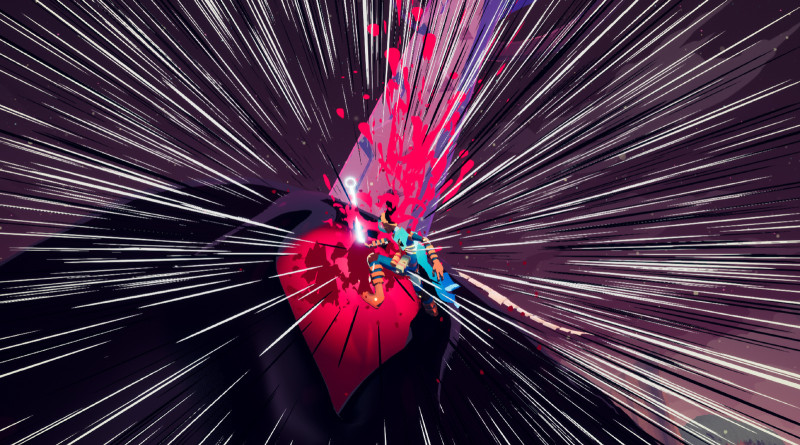
Solar Ash represents a dramatic leap forward for Heart Machine. After eleasing the 2D Zelda-inspired Hyper Light Drifter in 2016 to critical acclaim, fans of the game clamored to see what was next and many were surprised to see something totally different. Solar Ash is bigger and bolder than Hyper Light Drifter in every way, from its switch to a fully 3D world to its new emphasis on high-speed traversal over combat-focused dungeon crawling. But what is Solar Ash? Heart Machine’s creative director, Alx Preston, took us through a tour of the game to discuss its origins, gameplay, and how he is coping with the fear of the sophomore slump.
In Preston’s words the “stupid elevator pitch” for Solar Ash is Super Mario Galaxy meets Shadow of the Colossus. Given that Solar Ash takes place in a beautiful abstract alien world, features tons of platforming, and pits players against titanic bosses, the description has merit. Unlike the 2D pixels that built Hyper Light Drifter, Solar Ash’s fully realized 3D environments give Preston the chance to craft the sort of worlds that provided an immersive escape for him during the advent of 3D graphics.
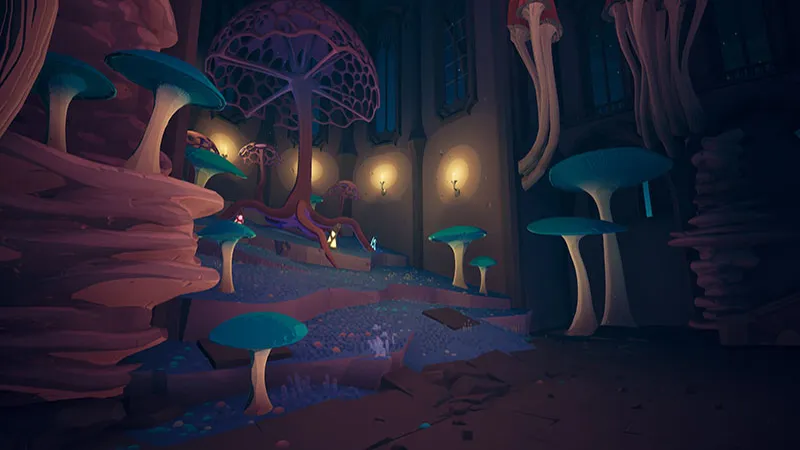
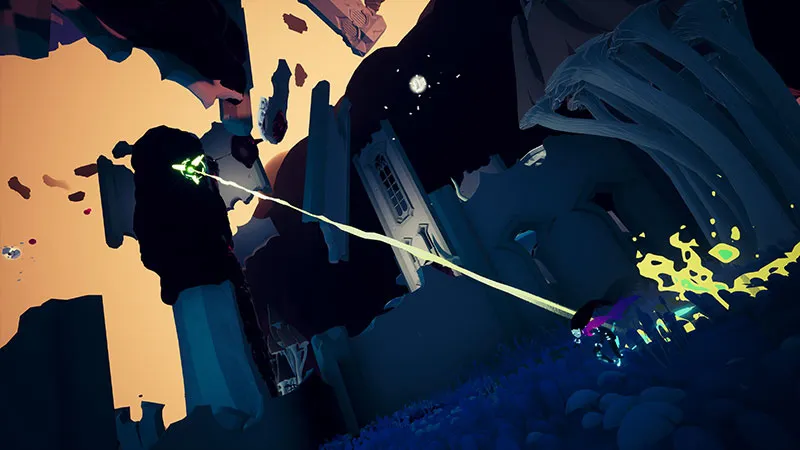
“I definitely at a certain point had ambitions beyond just 2D that I wanted to get into with 3D because that's where I think games really changed my perspective on what was possible creatively,” says Preston. “My first few 3D games I truly loved, like [Super] Mario 64 and all that stuff, it just opened my eyes to a whole new world.”
Heart Machine is still keeping most of the details about Solar Ash’s plot close to the chest, but we do know that players control a voidrunner named Rei. What is a voidrunner, you ask? Think of them as cosmic spelunkers who explore black holes in search of resources. Preston describes Rei as a “very capable” voidrunner with a good head on her shoulders. She’ll need to be good at her job, because one particularly dangerous black hole known as the Ultravoid threatens to swallow her home world. To prevent this, she’ll have to dive head-first into the Void to uncover a way to save her planet.
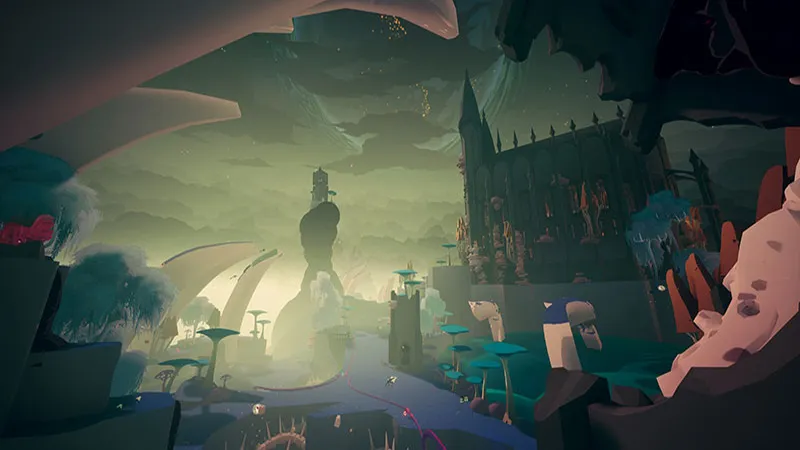
Within the Ultravoid lies a fragmented world of surreal alien beauty. Tree-sized mushrooms, sea anemone-like grass, and luminous orange rivers – all surrounded by a layer of thick green clouds – are just a few of the natural sights players will admire. Solar Ash is a trippy visual delight that pops with color.
The Ultravoid is divided into various expansive biomes, fragments of the worlds that have been consumed over presumably eons. Everything is designed to emphasize the game’s primary selling point: high-speed platforming. While designing Hyper Light Drifter, Preston originally wanted the game to feature speedy traversal elements. However, those ideas fell to the wayside due to Drifter’s more limited scope and to focus on its stronger combat aspects.
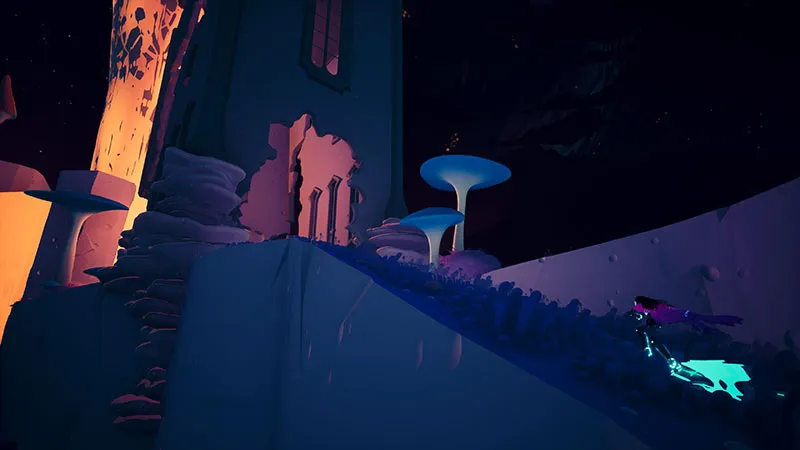
Rei is quickness personified, gracefully exploring the Ultravoid using a form of skating that Preston says is inspired by games such as Tony Hawk’s Pro Skater, Jet Grind Radio, and Super Mario 64. For Mario in particular, Preston was primarily fascinated in how speedrunners chain together plumber’s moves to complete the game in quick fashion. “Watching speed runs and how they do it's like, there’s a flow to that. That’s super inspiring to me,” Preston says.
In addition to skating and jumping, Rei can also grind on rails and utilize a handy lasso to hook onto grapple points to pull herself across gaps. Solar Ash is all about flow of movement and traversal, and Preston hopes that seamlessly stringing these moves together to overcome obstacles feels as satisfying as it looks. It looks so cool that it hurts the ego to miss a jump but thankfully nothing else thanks to the lack of fall damage.
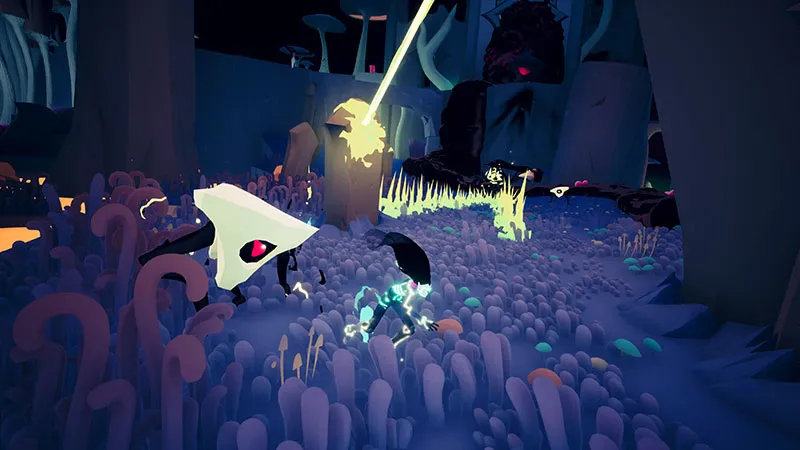
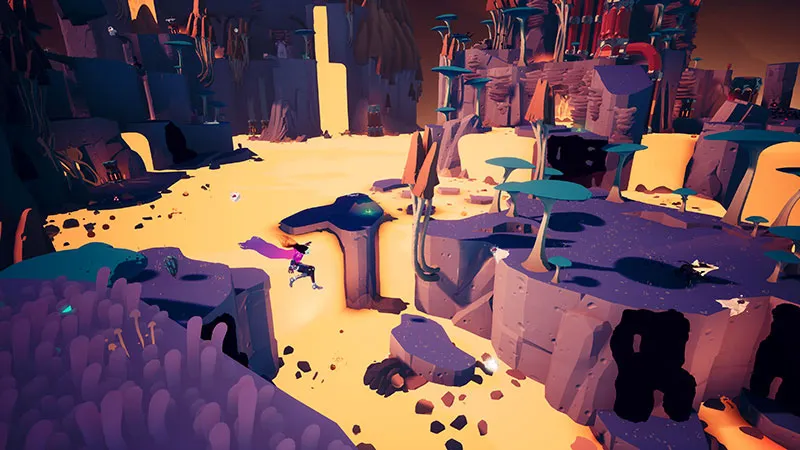
Along the way various monsters will appear to impede Rei’s progress. They don’t present a steep challenge; you can take them down in just a few hits. Don’t expect to learn new combo strings or anything complicated like that, either. Heart Machine wants to keep players moving so combat consists of simple hack-and-slash elements while using speed boosts and dodging to outmaneuver foes before quickly returning to exploration. Since you’ll still likely be in the middle of platforming while engaged in combat, the depth comes from how players incorporate the environment into their offense.
“We throw a bunch at you during platforming challenges to kind of elevate that,” Preston explains. “So, it's a blend between the environment that they're in and the individual mob or mobs themselves. It's kind of that interplay and intersection that we're trying to balance out.”
To that end, expect to face plenty of flying enemies or foes perched on platforms firing ranged attacks, in addition to opponents that just come at you head-on. But at the end of the day, enemies are more or less glorified speed bumps. They’ll get in the way, but if you’re both quick and savvy enough, you can drop them without losing your forward momentum.
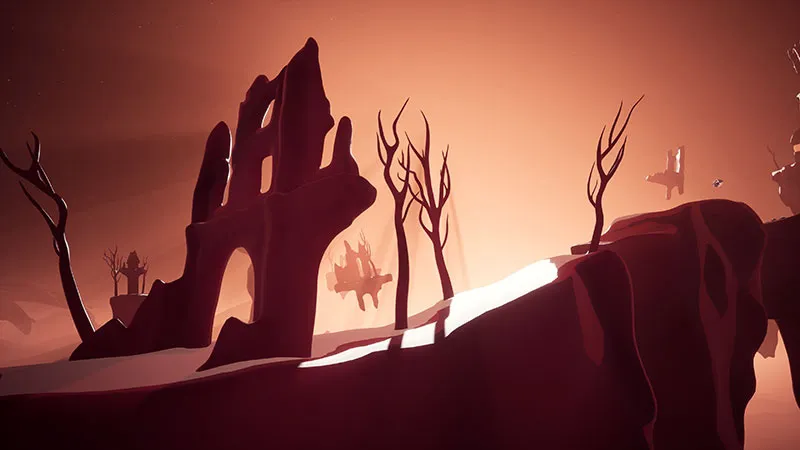
You don’t have time to sweat the small fry for too long anyway. Your primary order of business in each zone is to seek out and slay its Remnant. These massive beasts come in all shapes and sizes, but they’re hidden and must be drawn out. To summon the Remnant, first Rei has to take out Dregs, strange eyeballs attached to walls and other surfaces that are scattered around the environment. It’ll take some platforming finesse to reach and destroy them all, but doing so provokes the Remnant to arrive in all of its majestic beauty. The Remnant we got to see takes the form of a massive flying serpent protected by a thick, bony armor resembling a spinal column.
Of course, getting the beast to show its face is the easy part. The real challenge comes in taking it down. Defeating this particular Remnant requires Rei to leap atop its back and work her way to its head. The Remnant soars through the air, challenging the player to stay on board as it twists its body in an attempt to knock Rei off. Rei gradually jumps and skates her way towards the front, taking out glowing nodes along the way until she reaches her target. Once perched atop the skull, she delivers a final stab to the head as a killing blow, the impact of which washes out the screen in a black and white flash for a striking dramatic effect. Although I got to see how Rei takes down this specific Remnant, Preston says other Remnants possess different behaviors and patterns. In terms of the number of Remnants players will face, Preston simply says there will be “a good amount” of them.
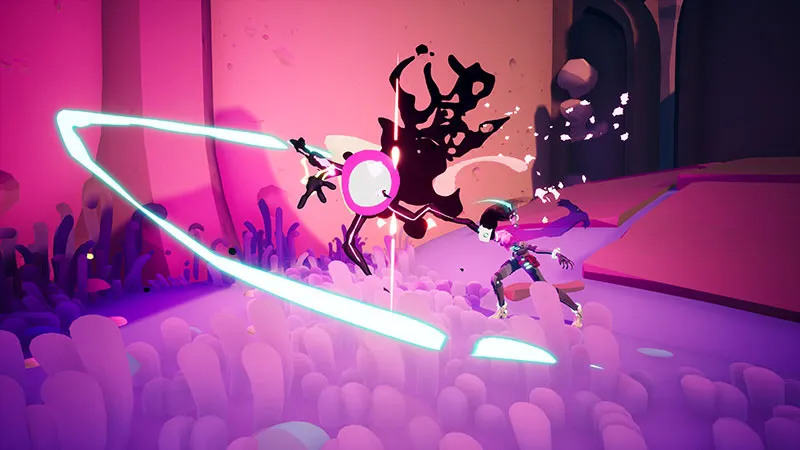
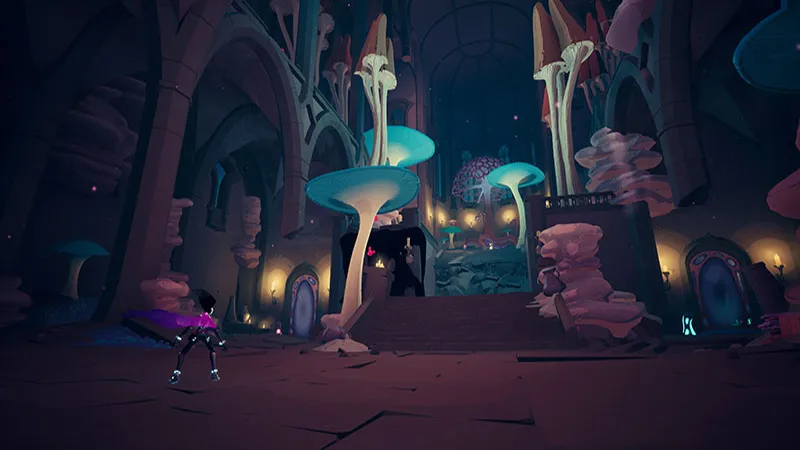
Once the Remnant falls, a node on a towering device called the Star Seed lights up. In every level we saw, this strange contraption can be seen from pretty much anywhere, and the central goal of the game is to activate all of its nodes. Visiting the Star Seed reveals that the imposing corpse of the Remnant Rei just killed now rests at its base. One would assume that this area will be the final resting place for the other Remnants but Preston cryptically says that “they lay as long as they may lay.”
Zones within the Ultravoid may appear to be little more than a series of platforming challenges but there’s plenty of secrets and lore to uncover should you decide to poke around. Certain pockets, which Preston refers to as narrative spaces, allow players to take their time inspecting ancient architecture and artifacts for information that feeds into the game’s world-building. Solar Ash spells out its narrative in a more straightforward fashion compared to Hyper Light Drifter. It has actual text, for example. Converse with NPCs and they’ll share personal stories about how they ended up inside of the Ultravoid.
“Our crews put a lot of time and effort into fleshing out and expressing a lot of different ideas about the kind of events that have happened here and sad or tragic stories that have occurred throughout these different biomes that have been sucked into the Ultravoid, “says Preston.
Speaking of other characters, Rei will also receive assistance from allies. One of them is Cyd, a sentient A.I. that provides guidance about each zone and backstory on the voidrunners. She also outfits Rei with some limited upgrades. There’s also the giant, ethereal humanoid seen in the trailers. Rei visits this being often, and its role is one of the game’s most tantalizing mysteries. However, Preston still isn’t ready to delve into that element of the story just yet, so the creature remains left to our imagination.
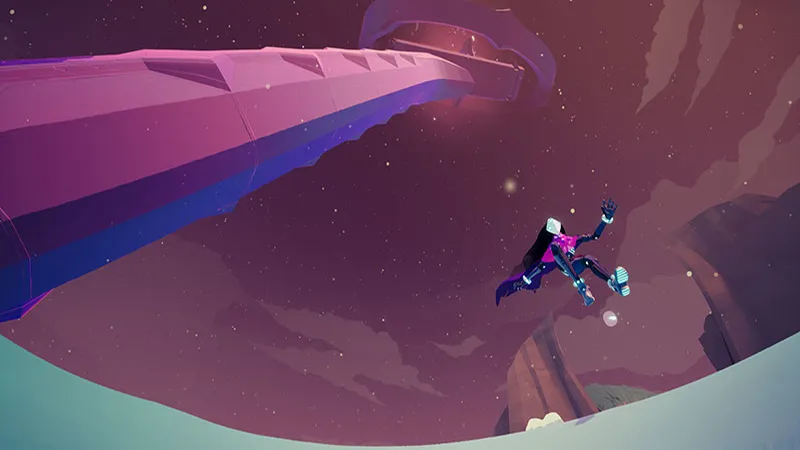
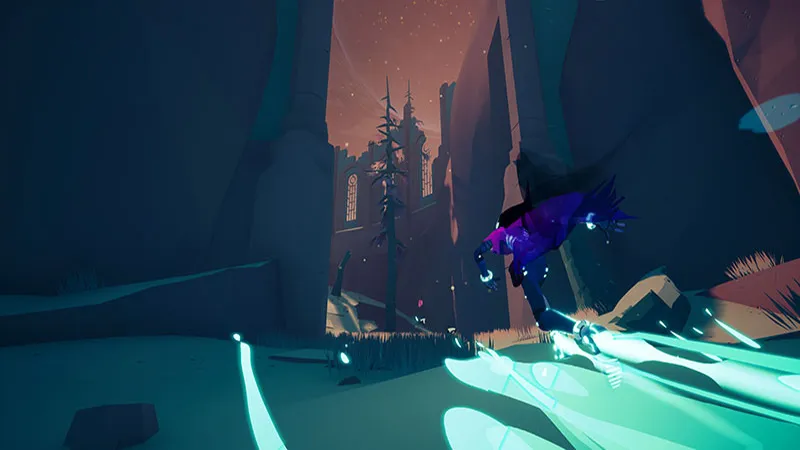
Solar Ash has been in development for four years now, and Heart Machine has grown from having under 10 regular employees during Hyper Light Drifter’s production to more than 20. Much of that growth has been staffing up on designers with expertise in crafting 3D worlds, and while the learning curve has brought its share of challenges, Preston says the secret to coping with those hardships has been ensuring he has good people on his team. “I think that's the key for me, was making sure to keep bringing over talented, good-natured people that wanted to build really dope stuff together that were good collaborators … it becomes a whole lot more enjoyable and easier to bear the burden of the challenge.”
Of course, for every studio that has a successful first outing, there’s always the fear of the sophomore slump. As a designer, Preston says he suffers the same anxieties about failing as any other creative person. He’s his own worst critic, and despite his overwhelming pride for Solar Ash, the fear of disappointing players who loved Hyper Light Drifter occasionally rears its ugly head.
“That being said, you can’t let it get the best of you,” says Preston. “And you have to be able to push forward and focus on the stuff that’s right in front of you. Not the what-could-be's or anything like that. Otherwise, you’ll spiral, you’ll just get trapped. And that's all it is. It’s a trap.”
Despite those anxieties, Preston couldn’t be prouder of what Heart Machine has accomplished with Solar Ash and firmly believes it’s created a fun and unique experience.
“Regardless of scores, of people being disappointed because it’s not Hyper Light next, or whatever else, there’s a ton of really cool stuff in here that you'd be a fool to miss.”
This article originally appeared in Issue 337 of Game Informer.
No comments:
Post a Comment